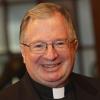Although he failed to receive the Nobel Peace Prize last week, Pope Francis continues his efforts at Middle East peacemaking in what is truly an epochal conflict across the region. In his latest move, the Holy Father has called for a consistory of cardinals and patriarchs for Oct. 20, immediately following the extraordinary Synod of Bishops on the family, to discuss the ongoing conflict with which the future of the region's churches are inevitably intertwined.
This is the second time in a month the pope has convoked a meeting to address the tragedy of Christians in the Middle East.
The nuncios posted to the region, along with Archbishops Silvano Tomasi and Bernardito Auza, the diplomats representing the Holy See at the United Nations in Geneva and New York, met Oct. 2-4 in Rome.
Vatican Secretary of State Cardinal Pietro Parolin, who chaired the meeting of nuncios, is also scheduled to address the other cardinals. In a Sept. 29 address to the U.N. General Assembly, the cardinal described the Islamic State group in bold terms: "a terrorist organization which threatens all states, vowing to dissolve them and to replace them with a pseudo-religious world government."
While still cautious about the use of force, the cardinal said, "the Holy See hopes that the international community will assume a responsibility in considering the best means to stop all aggression and avoid the perpetration of new and even greater injustice." In a statement following the meeting, the nuncios announced that "the resolution of the problem cannot be entrusted solely to a military response."
Three nonmilitary issues the consistory should weigh:
- Emigration and resettlement of Christian refugees
- The cohesion and continuity of the Eastern Churches
- The coordination and expansion of humanitarian aid
Emigration and resettlement
The multiple conflicts across the region make it nearly impossible to envisage a time when persecuted minorities, including Christians, might return to their native places. As I shall explain, Christians' flight to the diaspora need not be regarded as "an existential threat" to their future as distinctive churches within the one Catholic church. Work must begin to help their people rebuild normal lives through resettlement, either in their countries of refuge or in hospitable third countries.
In solidarity, Catholics in the United States and in other larger Western countries, like Canada and Australia, ought to press for admission and integration of Christian refugees into new homelands. During years of crisis in Iraq and more recently in Syria, the United States has admitted only token numbers of persecuted Christians. It is time to press Congress and the Obama administration to throw open the doors to these persecuted members of the Christian family.
Cohesion and continuity of the patriarchates
The bishops of the Eastern Churches fear losing their people to the diaspora. When nothing but conflict can be anticipated for years ahead, however, the choice is between asking their people to languish for generations to come in refugee camps, like the Palestinians of 1948, or allowing them to rebuild in the diaspora, where some churches, like the Melchites and Maronites, are already numerous and flourishing.
Sometimes, the diaspora option is rejected because the patriarchs are said to lack full jurisdiction outside their ancient homelands. But I am told by a usually reliable source that under the canon law of the Eastern Church, with small exceptions, they hold full jurisdiction in the diaspora. If it turns out that that is not so, in the interest of building vibrant, expanded churches in the diaspora, it is time for Rome to acknowledge that the full, universal jurisdiction of the Oriental patriarchs can be accepted without diminishing their communion with Rome.
Coordination and expansion of humanitarian aid
With winter approaching, the provision of humanitarian aid to refugees and the displaced in Syria, Iraq and Kurdistan is urgent. Funding for the international aid agencies is insufficient right now to meet the anticipated need. When the Vatican speaks of protecting the affected populations by more than force, making up for the lack of funding for the U.N. Refugee Agency, the World Food Program and other agencies should be at the top of the foreign policy agenda for all concerned for religious liberty abroad, especially for those running for Congress. We must invest as much in humanitarian aid as in the weapons of war.
In Syria, church agencies are now coordinating their aid programs. A similar coordination should be attempted with aid to the church in Iraq. Aid needs to be directed particularly to the less well-known churches, like the Syriac Catholics, who for their numbers receive too little help from abroad.
[Jesuit Fr. Drew Christiansen is former editor of America magazine and a professor of ethics at Georgetown University. He served as an expert at the 1999 Congress of Catholic Patriarchs and Bishops of the Middle East.]




